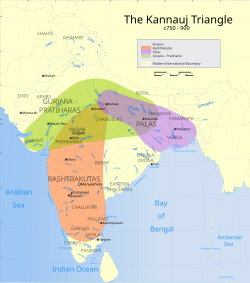Pratihara
| Gurjara-Pratihara | ||||||||||||||||||
|
||||||||||||||||||
|
Extent of the Pratihara Empire shown in green
|
||||||||||||||||||
| Capital | Kannauj | |||||||||||||||||
| Languages | Sanskrit, Prakrit | |||||||||||||||||
| Religion | Hinduism | |||||||||||||||||
| Government | Monarchy | |||||||||||||||||
| Historical era | Late Classical India | |||||||||||||||||
| • | Established | mid-7th century CE | ||||||||||||||||
| • | Conquest of Kannauj by Mahmud of Ghazni | 1008 CE | ||||||||||||||||
| • | Disestablished | 1036 CE | ||||||||||||||||
|
||||||||||||||||||
| Today part of |
|
|||||||||||||||||
The Gurjara-Pratihara Dynasty, also known as the Pratihara Empire, was an Indian imperial power that ruled much of Northern India from the mid-7th to the 11th century. They ruled first at Ujjain and later at Kannauj.
The Gurjara-Pratiharas were instrumental in containing Arab armies moving east of the Indus River.Nagabhata I defeated the Arab army under Junaid and Tamin during the Caliphate campaigns in India. Under Nagabhata II, the Gurjara-Pratiharas became the most powerful dynasty in northern India. Nagabhata II was succeeded by his son Ramabhadra, who ruled briefly, and was succeeded by his son Mihira Bhoja. Under Bhoja and his successor Mahendrapala I, the Pratihara Empire reached its peak of prosperity and power. The extent of its territory rivaled that of the Gupta Empire, by the time of Mahendrapala, the empire reached west to the border of Sindh, east to Bengal, north to the Himalayas, and south past the Narmada. The expansion once again triggered the power struggle for the control of the Indian Subcontinent, known as the Tripartite Struggle, with the Rashtrakuta Empire and Pala Empire. During this period, Imperial Pratihara took the title Maharajadhiraja of Āryāvarta (Great King of Kings of India).
Gurjara-Pratihara are known for their sculptures, carved panels and open pavilion style temples. The greatest development of Gurjara-Pratihara style of temple building took place at Khajuraho (a UNESCO World Heritage Site).
...
Wikipedia

